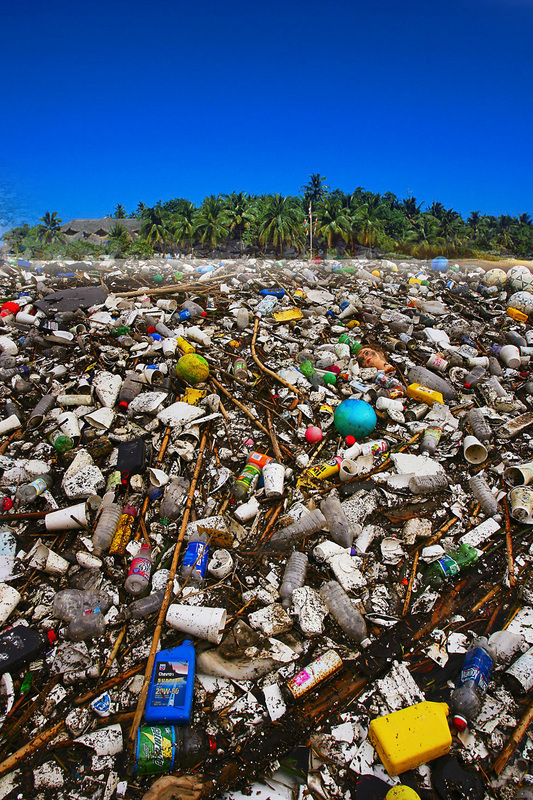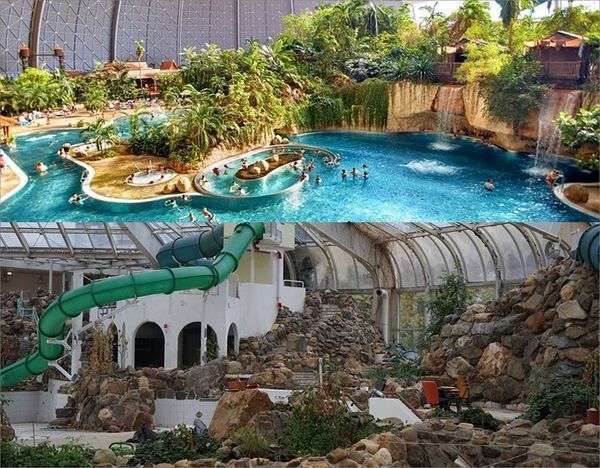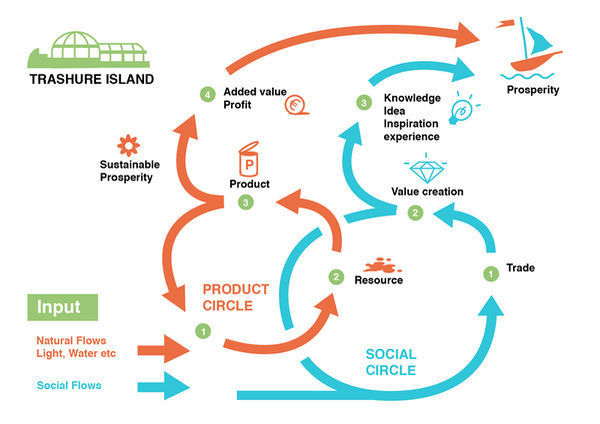User:Nicky
Voorwoord
Trashure island
The masterclass circular economy
During the past century, most cities have become agglomerations of monofunctional districts which are basically disconnected from each other. Residential neighbourhoods, industrial estates, office complexes, farming districts and recreational areas are spatially delimited by administrative boundaries, making it harder to make good use of their mutual presence. The ever-increasing flow of goods, energy, water, food and even capital is disconnected form the location where these are created, contributing to endless transportation, traffic congestion, waste of energy and pollution.
In Trashure island we learned how to promote the exchange between existing flows, by making smart new connections – the main requirement of an ecosystem. You will also be learning which business models are relevant to these strategies.The former tropical swimming paradise Tropicana is now the temporary location for various businesses including a restaurant and a bar, as well as facilities for roasting coffee and farming oyster mushrooms. The host of the master class is Mark Slegers, cofounder Rotterzwam, the local mushroom farming business which grows mushrooms on coffee grounds. This is a working business case which we took as a starting point for transforming Rotterdam’s Topicana into a centre for innovation: sustainable, connecting and regenerative. This Rotterdam landmark is a metaphor for new ways of thinking, sharing, working and relaxing, with an important focus on recycling as well as research into flows of goods, energy, water, food and even capital. The masterclass resulded in connections between local surpluses, shortages and bottlenecks, thus creating new functions and business cases for Tropicana. During the master class, experts in blue economy, finace, city farming and metabolim visit the masterclass in Topicana to share their expertise, to question ideas, and to provide these ideas with ‘feed-forward’.
Thanks to: Mark Slegers & alle medewerkers Rotterzwam, host and inspirator. Rechtstreex, voor de heerlijke lokale lunch Norbert Bol, Director of Grondmij capital invest. Mark Bode, WDKA Hans Huurman, gemeente Rotterdam Dave Geensen, poppodium Rotterdam De deelnemende studenten Bouwkunde minor dIB, Minor social practice WDKA en studenten social economy, erasmus universiteit Alle betrokkennen van de WDKA Superuse Studios
Overall concept
There are many problems in the world. One of them is waste. Let´s take the tropical islands for example. When you think of tropical islands, you often imagine white beaches, a clear blue sea and lots of palm trees. However, reality is different. There is a lot of pollution because of the oil industry, the production of plastics but also trash that´s being dumped all around the world. All these waste problems mostly occur from of the linear economy. In the linear economy we produce a lot of products to our needs but we do not care enough about these waste flows. This results, for example in a very different image of our tropical islands. We, the people who produce all this waste, are responsible for the consequences. We are trashing our Mother Earth.
Tropicana used to be an iconic building in Rotterdam. It was a promise of a tropical experience. It looks very different nowadays compared to what it was. Tropicana as well, has become a tropical island which is trashed. A dream is decay. It became a failure because industrialization, business strategies and self-eager money-loving people made the word unable to deal with the consequences. What once was a paradise became a symbol of needed change.
Rotterdam has recently been chosen as main capital of Europe, mainly because the city is a leader in sustainability. Why not use Tropicana as a building that represents sustainable development and give the building the iconic status back?! Tropicana will be Trashure Island, an island which will share and show sustainable ideas, mainly focussing on how to reuse waste flows. This creates a circular economy. It will be an ecosystem consisting of a lab and a knowledge centre where local people can learn by doing and where innovation and experiments can take place. This way the mindset of people can be changed and will be a new kind of educating. This results in BIY: Blue it yourself- economy. The waste flows of the the poppodium, which will soon be in the building, and the restaurant will also be a part of the circular ecosystem. This way, waste flows, trash and unemployed people become the new gold. Trasher becomes treasure again. It is an innovative way of creating awareness for sustainability for the people of Rotterdam and eventually for the rest of the world. This way, people can be introduced to the blue economy in an innovative way of education. This schedule shows how the ecosystem functions and which flows are a part of this system. It consists of a natural and a social flow. The natural flow has an input existing of waste, sunlight, water and air. These flows enter the system and transform into products, made by different stakeholders. These stakeholders can benefit from each other’s products, waste and rest flows. In this way, a circular ecosystem emerges.
The social circle shows how people asinput, create knowledge and experience. The people that participate in the system transform energy into value. This value is very important for the social system of Rotterdam and can eventually reach the rest of the world. The value here is global knowledge, local awareness, and social prosperity trough sustainable thinking.


